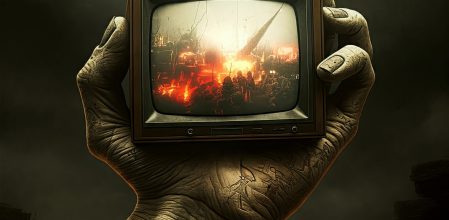By: Catrine
The media plays a crucial role in how we perceive the world. By choosing which news stories to highlight and how to present them, they shape our understanding of events and conflicts. But what happens when certain news stories are ignored, and how does this affect our view of reality?
In my last blog post, I talked about the fact that Sweden needs to learn from others and that the globalization happening in the world makes it difficult for us to remain neutral, which can create a sense of insecurity among people. In this blog post, I intend to turn this around and look at how little we as private individuals get to know about what is happening in the world. While I was aware on, before embarking on this blog project that media coverage does not include all global events. However, this work has made me realize that the news and perspectives presented by the media are ultimately their selections, and not necessarily those I would have chosen.
To highlight this, I will use my friends posts about what is happening in Mozambique, by Miriam, and the media bias in the coverage of Israel-Palestine, by FI, as examples.
Live from the Frontlines: One Man’s Fight for Democracy in Mozambique
Mozambique is experiencing a surge in public unrest driven by claims of electoral fraud and government corruption. Venâncio Mondlane, a political leader, is utilizing Facebook Live to mobilize a youth led movement asking for transparency and accountability. Despite peaceful protests, the government has responded with police violence and an internet blackout, restricting access to social media platforms and deadly outcomes.
I must admit that I don’t dare write more about this, as my level of knowledge on the topic is too low since Swedish media has not chosen to cover these disturbances. Instead, I refer you to Miriam’s post where you can get a better sense of the situation currently prevailing in Mozambique. Venâncio Mondlane and Mozambique’s Youth: A Digital Revolution Against Alleged Elecutral Fraud

I want to give this as an example of new being ignored. Looking at Swedish media, I have only once heard about this topic on the radio, and I have not seen it on the news. However, I don’t watch all the news, so I can’t say for sure that it hasn’t been featured in other news outlets. However, I did Google “Mozambique” and news in Swedish with the following unsettling results. 3 links to news in Swedish about what has happened in Mozambique.
Several factors contribute to this dwindling focus. Competing global events, like the war in Ukraine, draw attention and resources away. Additionally, Mozambique’s government has restricted internet access, hindering the flow of information and making it harder for journalists to report on the ground.
This loss of coverage is concerning as the situation in Mozambique could deteriorate further, with escalating violence and potential human rights violations going unnoticed by the international community.
Decolonizing the Headlines: Why Voices Are Missing from the Story
Now I would like to look at FI´s blogpost, Whose Story is Told? Palestine (Gaza)-Israel, and the Colonial Media Lens, and examine media bias in the coverage of conflicts. In the blogpost FI analyzes a WNYC podcast featuring experts who highlight the disproportionate focus on Israeli narratives and the silencing of Palestinian voices. The blog post emphasizes the importance of decolonizing media by listening to Palestinian voices, challenging dominant narratives, and providing equitable representation. It connects this issue to broader themes in development studies, highlighting the need to dismantle power structures and promote inclusive narratives in both media and development contexts. This example of media bias is not unique, and this criticism reflects a broader challenge for media coverage of conflicts.
When conflicts are filtered through a single lens, and especially when those conflicts remain hidden from the global spotlight, the consequences are severe. Ignoring diverse perspectives fuels polarization and deepens mistrust. The suffering of those affected becomes invisible, leading to unchecked human rights abuses and missed opportunities for peacebuilding.
This selective silencing undermines democratic values, erodes global responsibility, and prevents us from learning valuable lessons for conflict resolution. It fosters a dangerous environment of misinformation and prejudice, perpetuating suffering and hindering peace.
To counter this, we must strive for balanced reporting, amplify marginalized voices, and shed light on uncovered conflicts. Only then can we foster understanding, accountability, and ultimately, a more just and peaceful world.
The Importance of Communication for Development
When you consider how little we humans know about what’s happening in the world, you realize how important it is that we develop our studies in communication for development. This will allow us to provide information both for and about development so that people can learn from each other. By critically analyzing media coverage and promoting diverse perspectives, we can work towards a more informed and equitable world. Yes I might be a dreamer but we need to strive for a peaceful world to be able to reach it.

